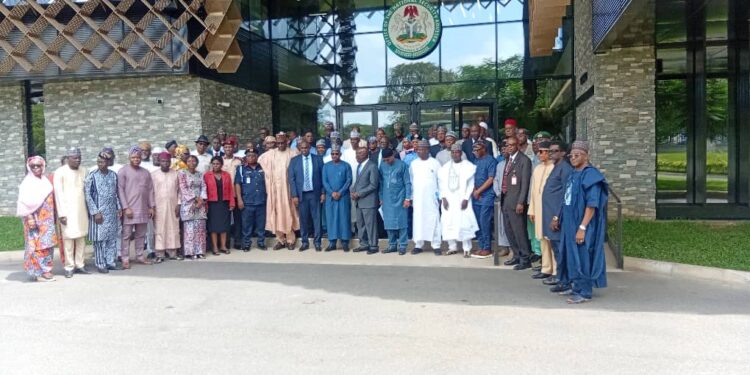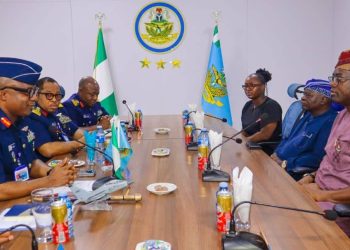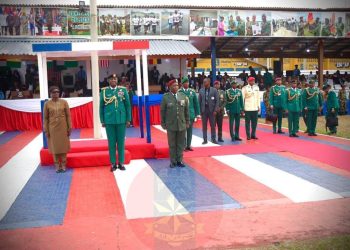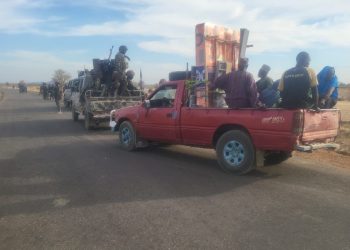…as NSA reaffirms federal government’s commitment to peace and stability
By Nkechi Eze
As Nigeria continues to navigate complex security challenges ranging from insurgency and banditry to separatist agitations and economic sabotage, the administration of President Bola Ahmed Tinubu has intensified efforts to strengthen national stability through far-reaching reforms and institutional coordination. Central to this renewed push is the office of the National Security Adviser (NSA), Mallam Nuhu Ribadu, whose leadership has been instrumental in reinvigorating the nation’s security architecture. Under his direction, the National Counterterrorism Centre (NCTC) has become a nerve centre for strategic coordination, fostering synergy among intelligence, defense, and law enforcement agencies while implementing innovative frameworks to enhance public safety and community resilience.
It is within this context that top security administrators from across the federation convened in Abuja for the Federal and State Security Administrators Meeting, a crucial policy session designed to harmonize national and subnational strategies in addressing emerging threats and sustaining peace across the country.
Declaring the meeting open, the National Security Adviser (NSA), Mallam Nuhu Ribadu, represented by the Special Adviser on Governance and Subnational Liaison, Asishana B. Okauru, reaffirmed the Federal Government’s unwavering commitment to peace, stability, and the protection of citizens.
Okauru, who conveyed the NSA’s apologies for his absence due to official engagements at the State House, emphasized that the administration of President Bola Ahmed Tinubu, GCFR, has made national security one of the defining pillars of its Renewed Hope Agenda.
“Indeed, this meeting is taking place at a time when the present administration is working tirelessly to address the security challenges in our country,” he said, noting that President Tinubu has consistently demonstrated the political will to reposition the security sector for optimal performance.
He explained that since assumption of office, the President has taken bold and far-reaching steps to strengthen the Armed Forces for more effective counter-insurgency and counter-terrorism operations. This includes the acquisition of modern military platforms, advanced weapon systems, and logistics support to enhance operational capabilities.
The NSA’s representative also disclosed that the Federal Government has intensified collaboration among intelligence, law enforcement, and defense agencies, resulting in stronger synergy and more effective joint operations across the country.
According to him, these initiatives have begun to yield tangible results, with Boko Haram and ISWAP elements substantially degraded and thousands of insurgents and their families surrendering to troops. He said spontaneous terrorist attacks have also dropped considerably, a development attributed to improved coordination and decisive field operations.
Okauru further revealed that the Armed Forces have sustained pressure on armed bandits in the North-West and North-Central regions, neutralizing scores of them, rescuing hostages, and restoring peace to previously volatile areas, particularly in parts of Kaduna and Katsina States.
He highlighted the Forest Guards Initiative as one of the administration’s most innovative interventions, describing it as a game-changer in addressing the threat of criminality in Nigeria’s forests. “As reiterated by Mr. President, the initiative is designed to flush out bad elements from our forest reserves and restore sanity to our rural communities,” he stated.
Okauru added that separatist activities in the South-East and parts of the South-South have been largely curtailed, noting that the sentencing of Simon Ekpa by Finnish authorities has further reduced secessionist propaganda and violent agitation. He also disclosed that security in Nigeria’s maritime domain has improved significantly, with piracy and sea attacks now under control, an achievement that has enabled the country to exceed its crude oil production quota as set by the Organization of Petroleum Exporting Countries (OPEC).
“National security agencies have raised the bar in maritime safety and surveillance, and the outcome is reflected in Nigeria’s improved oil production levels and safer shipping corridors,” he said.
While declaring the meeting open, Okauru commended the dedication of participants and urged them to develop actionable strategies that would further strengthen national security. “As security administrators from various ministries, departments, and agencies across all 36 states and the FCT, you have a critical role to play in articulating effective responses to the diverse security challenges confronting our country. The government awaits your recommendations and will continue to support all efforts aimed at ensuring lasting peace and stability,” he said.
In his welcome address, the Permanent Secretary, Special Services Office, Mohammed Sanusi Danjuma, described the meeting as an essential forum for coordination, dialogue, and information sharing among security administrators across the federation.
He stated that the gathering was convened to deliberate on pressing security issues, including the operationalization of the Forest Guards Initiative, illegal mining, the activities of scavengers popularly known as Baban Bola, and the management of natural and human-induced disasters.
Danjuma revealed that the Forest Guards Initiative approved by President Tinubu will deploy about 30,000 armed operatives across Nigeria’s 1,129 forests and game reserves. He explained that the pilot phase will commence in Anambra, Borno, Niger, Kebbi, Kwara, Sokoto, and Yobe States before its nationwide rollout.
“Some of Nigeria’s forests have become hideouts for terrorists, bandits, kidnappers, and other criminals. The success of this initiative will depend on strong political will, adequate funding, and the collective support of all states across the federation,” he stressed.
The Permanent Secretary also expressed deep concern over the rising cases of illegal mining, which he described as a major driver of insecurity, particularly in the North-West and North-Central regions. He warned that many criminal kingpins now fund their operations through illicit mining, sometimes in collaboration with foreign nationals from neighboring African countries and China.
He equally drew attention to the activities of scavengers who vandalize critical infrastructure such as rail tracks, solar streetlights, and manhole covers, as well as those who collect unexploded ordnance in conflict-affected areas, actions he described as posing grave danger to public safety.
Turning to disaster management, Danjuma lamented the recurring cases of tanker explosions, boat mishaps, and road accidents, which have claimed hundreds of lives and caused extensive property damage. Citing data from the Federal Road Safety Corps (FRSC), he revealed that in the first quarter of 2025 alone, 2,650 road crashes were recorded, leading to 1,593 deaths and over 9,000 injuries.
He also referenced the 2025 flood forecast by the Nigeria Hydrological Services Agency, warning that over 30 states and the Federal Capital Territory face potential flooding this year. “Flooding has already caused widespread devastation, displacement, and loss of livelihoods in some parts of the country. These disasters, whether natural or human-induced, demand effective coordination, proper funding, and improved awareness to minimize their impact,” he said.
Danjuma commended the NSA, Mallam Nuhu Ribadu, for his visionary leadership and support in hosting the meeting, as well as the National Coordinator, National Counterterrorism Centre (NCTC), Major General Adamu Laka, and his team for their technical and logistical support.
He urged participants to engage in robust, evidence-driven deliberations that would yield practical and sustainable recommendations to improve national stability and security management.
The meeting, which drew Federal and State Security Administrators, Permanent Secretaries, Special Advisers, Directors, and other key stakeholders, provided a high-level platform to review Nigeria’s security outlook and chart a more coordinated response to the evolving threat landscape, anchoring once again the Tinubu administration’s determination to translate its Renewed Hope Agenda into tangible peace and safety for all Nigerians.
















